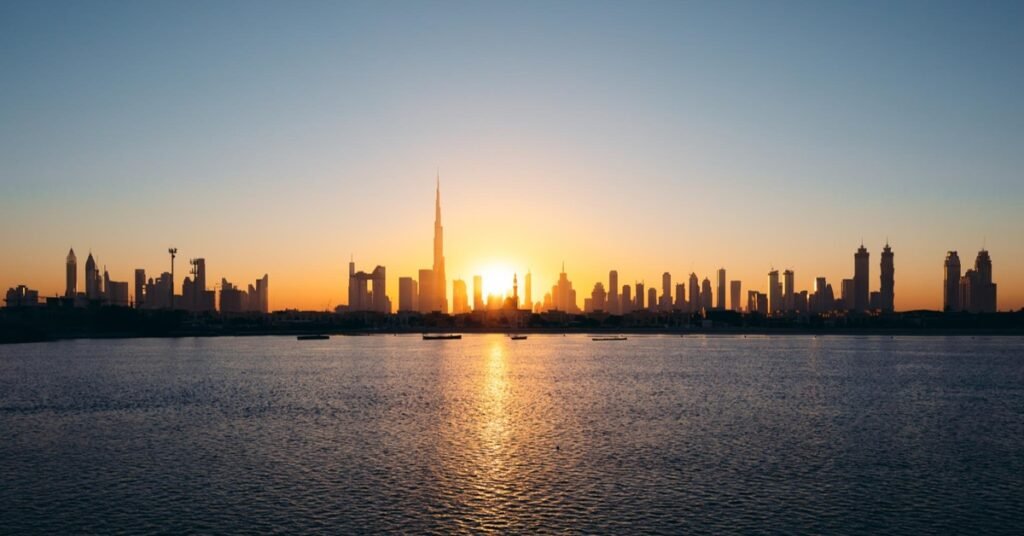
Introduction
Sun City Soars! Dubai’s Power Path to a Glittering Green Future
How Dubai is Soaring as a Sun City, a Cleantech Hub, and a Smart City
Dubai is the UAE’s biggest and most crowded city, is more than skyscrapers, luxury hotels, malls, and artificial islands. It is also a sun city, a cleantech hub, and a smart city, soaring with Dubai’s power from clean and renewable energy sources.
Why is renewable energy important for Dubai and the world?
Renewable energy benefits the environment, economy, society, and innovation. It uses the sun, wind, water, and other natural resources. It can help:
- Reduce greenhouse gas emissions
- Combat climate change
- Enhance energy security
- Diversify the energy mix
- Create green jobs
- Improve quality of life and health
- Foster technological advancement and creativity
What insights will readers gain from this blog post?
In this blog post, we will explore how Dubai is achieving its ambitious vision and goals for renewable energy and sustainability. Namely, the Dubai Clean Energy Strategy 2050. Which aims to provide 75% of Dubai’s total power output from clean energy sources by 2050. And the UAE Energy Strategy 2050. Which targets increasing the contribution of clean energy in the total energy mix from 25% to 50% by 2050.
We will also highlight some of Dubai’s remarkable achievements and initiatives in renewable energy. Including the Mohammed bin Rashid Al Maktoum Solar Park. Which is the largest single-site solar park in the world, with a planned capacity of 5,000 megawatts by 2030. And the Dubai Electricity and Water Authority (DEWA). Which has been recognized as one of the best utilities in the world for its efficiency, reliability, and sustainability.
We will also talk about renewable energy’s pros and cons for Dubai and the region. Dubai is tackling them with creative solutions and opportunities. For example, Expo City Dubai is the first World Expo fully powered by renewable energy. The Dubai Green Fund offers cheap funding for green projects. The R&D and innovation programs, like the Dubai Future Accelerators and the Dubai Future Foundation, help create and use advanced technologies and solutions in renewable energy. Moreover, there is potential for both regional and global collaboration and leadership. This includes organizations like IRENA in Abu Dhabi and the Dubai Carbon Centre of Excellence. Which stands as a premier carbon management and consultancy firm in the region.
What justifies your continued perusal of this blog post?
In this blog post, you will find valuable insights, tips, and resources on:
- How to join the renewable energy revolution and make a difference in Dubai’s energy story
- How to adopt eco-friendly practices and sustainable solutions in your own homes and communities:
- Using energy-efficient appliances
- Installing solar panels
- Reducing water consumption
- Recycling waste
- Supporting green initiatives and policies
- How to benefit from the opportunities and innovations in renewable energy in Dubai:
- The Expo City Dubai, which will be the first World Expo to be powered entirely by renewable energy
- The Dubai Green Fund, which will provide low-cost financing for green projects
- The R&D and innovation programs, such as the Dubai Future Accelerators and the Dubai Future Foundation. Which will support the development and deployment of cutting-edge technologies and solutions in renewable energy
- The potential for regional and global cooperation and leadership. Such us the International Renewable Energy Agency (IRENA) and the Dubai Carbon Centre of Excellence
- Dubai’s vision and achievements in renewable energy and sustainability inspire us. As a sun city, a cleantech hub, and a smart city, Dubai sets an example for the world.
This isn’t just a blog post; it’s a roadmap, an invitation to become a part of Dubai’s sun-kissed future. Get ready, for a journey where the sun is more than light. It is hope and Dubai’s pledge to a sustainable world.
Ready to shine? Let’s dive into Dubai’s “power” together!
Table of Contents
I. Dubai’s Vision and Achievements in Renewable Energy
II. The Benefits and Challenges of Renewable Energy for Dubai and the Region
III. The Opportunities and Innovations in Renewable Energy in Dubai
IV. Tips and Recommendations for Eco-Friendly Practices and Sustainable Solutions
VI. Call to Action
I. Dubai’s Vision and Achievements in Renewable Energy
A. Dubai’s Vision and Goals for Renewable Energy
Dubai has a clear and ambitious vision for renewable energy and sustainability. It is reflected in its strategic plans and policies:
- The Dubai Clean Energy Strategy 2050, which aims to provide 75% of Dubai’s total power output from clean energy sources by 2050 and to make Dubai the city with the lowest carbon footprint in the world by 2050,
- The UAE Energy Strategy 2050 targets increasing the contribution of clean energy to the total energy mix from 25% to 50% by 2050 and reducing the carbon footprint of power generation by 70% by 2050.
- The Dubai Integrated Energy Strategy 2030 seeks to reduce energy demand by 30% by 2030 and diversify the energy mix by increasing the share of solar power to 25%, nuclear power to 7%, clean coal to 7%, and gas to 61% by 2030.
These visionary goals demonstrate Dubai’s commitment and leadership in renewable energy and sustainability. Beside its determination to become a sun city, a cleantech hub, and a smart city.
B. Dubai’s Achievements and Initiatives in Renewable Energy
Dubai’s renewable energy and sustainability achievements and initiatives are clear in its projects and programs:
- The Mohammed bin Rashid Al Maktoum Solar Park, which is the largest single-site solar park in the world, has a planned capacity of 5,000 megawatts by 2030 and a total investment of AED 50 billion. The solar park consists of various phases and technologies, such as photovoltaic, concentrated solar power, and hybrid systems, and it will generate 6,500 gigawatt-hours of clean energy annually by 2030, enough to power 1.42 million homes and reduce 6.5 million metric tons of carbon emissions per year.
- The Dubai Electricity and Water Authority (DEWA) has been recognized as one of the best utilities in the world for its efficiency, reliability, and sustainability. DEWA has achieved a world record of 2.2% for electricity transmission and distribution losses (March 2023). In comparison to the global average of 8%, this remarkable accomplishment underscores DEWA’s commitment to operational efficiency. Furthermore, the DEWA has initiated several impactful programs to advance renewable energy and sustainability. Among these initiatives is the Shams Dubai program, encouraging customers to install solar panels on their rooftops and connect them to the grid. Additionally, DEWA has introduced the Green Charger initiative, which promotes the use of electric vehicles and establishes charging stations throughout the city. Complementing these efforts is the Smart Grid project. Which designed to establish an intelligent and integrated network capable of managing electricity supply and demand, reducing losses, and enhancing overall efficiency.
These impressive achievements and initiatives show Dubai’s excellence and innovation in renewable energy and sustainability, as well as its potential to become a global leader and a role model for the world.
II. The Benefits and Challenges of Renewable Energy for Dubai and the Region
A. The Benefits of Renewable Energy for Dubai and the Region
Renewable energy offers many benefits for Dubai and the region:
- Reducing carbon emissions: Renewable energy sources, such as solar, wind, and hydro, do not emit greenhouse gases that contribute to global warming and climate change. By switching to renewable energy, Dubai and the region can reduce their carbon footprint and meet their commitments under the Paris Agreement, which aims to limit the global temperature rise to well below 2°C above pre-industrial levels.
- Enhancing energy security: Renewable energy sources are abundant, diverse, and locally available, unlike fossil fuels, which are finite, concentrated, and imported. By increasing the share of renewable energy in the energy mix, Dubai and the region can reduce their dependence on foreign oil and gas and avoid the risks of price volatility, supply disruptions, and geopolitical conflicts.
- Diversifying the economy: Renewable energy sources can create new opportunities for economic growth, diversification, and innovation. By investing in renewable energy, Dubai and the region can develop new industries. Including cleantech, smart city, and green economy, and create new jobs, such as engineers, technicians, and entrepreneurs. Renewable energy can also stimulate other sectors. Such us tourism, education, and health, by improving the environmental quality and attractiveness of the city and the region.
- Improving the quality of life and health of the people: Renewable energy sources can improve the quality of life and health of the people by providing clean, affordable, and reliable electricity and water. Moreover, renewable energy mitigates air pollution, a key factor in respiratory diseases, enhancing well-being, particularly in hot summers.
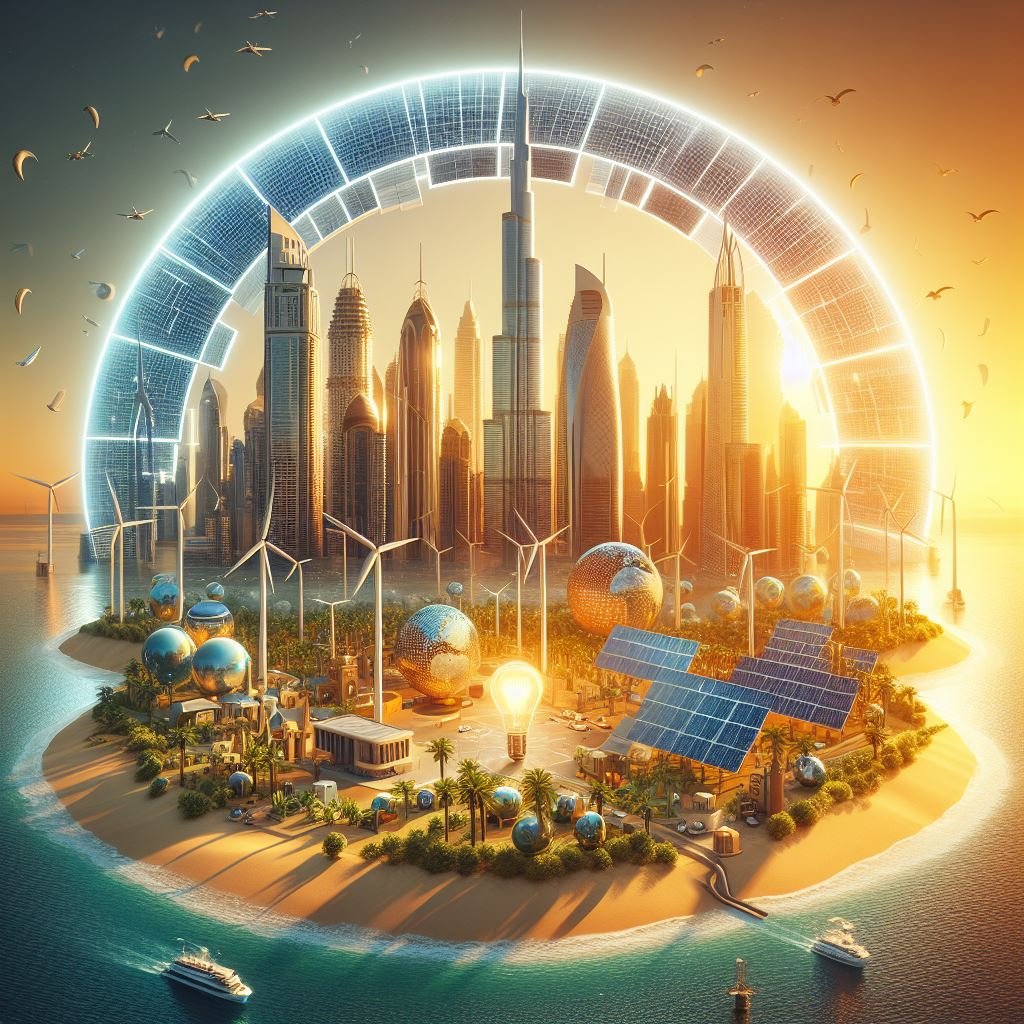
B. The Challenges of Renewable Energy for Dubai and the Region
Renewable energy also faces some challenges for Dubai and the region:
- Overcoming technical and financial barriers: Renewable energy sources require high upfront capital costs, advanced technologies, and skilled human resources. Which may not be readily available or accessible for Dubai and the region. Renewable energy sources encounter technical challenges. These include intermittency, variability, and storage issues, impacting power system performance and reliability.
- Ensuring grid stability and integration: Renewable energy sources need to be integrated into the existing power grid, which may not be designed or equipped to handle the fluctuations and uncertainties of renewable energy generation. Renewable energy must align with conventional and non-conventional sources, like gas, nuclear, and demand response, ensuring power system stability. Coordination is crucial for balance.
- Managing demand and supply: Renewable energy sources depend on the availability and intensity of natural resources, like sunlight, wind, and water. However, these may not match the demand and consumption patterns of the city and the region. Additionally, need to be aligned with the policies and regulations of the power sector, including tariffs, subsidies, and incentives, to ensure the economic viability and competitiveness of renewable energy projects.
- Fostering public awareness and acceptance: The public, who may have different perceptions, preferences, and behaviors regarding renewable energy and sustainability, needs to support and embrace renewable energy sources. Moreover, efficient communication is vital for promoting awareness and understanding of the benefits and challenges of renewable energy. This encourages stakeholder engagement, including customers, investors, and policymakers.
III. The Opportunities and Innovations in Renewable Energy in Dubai
Dubai is not only a sun city, a cleantech hub, and a smart city, but also a city of opportunities and innovations in renewable energy. Dubai has launched and supported various projects and programs that showcase its creativity, ingenuity, and leadership in renewable energy and sustainability:
A. Expo City Dubai
Expo City Dubai is the first World Expo to run on renewable energy. It spans 4.38 square kilometers, hosts 190 countries, and welcomes millions of visitors. The Word Expo has four pavilions, each with a sub-theme: Opportunity, Mobility, Sustainability, and Innovation. It displays cutting-edge renewable energy technologies and solutions. For example, the Sustainability Pavilion has a solar roof that produces 4 megawatts of power. The Mobility Pavilion has a solar-powered self-driving car that moves visitors around. Moreover, it is a platform for sharing knowledge, insights, and best practices on renewable energy and sustainability. Furthermore, it strives to spark global cooperation and action in the community.
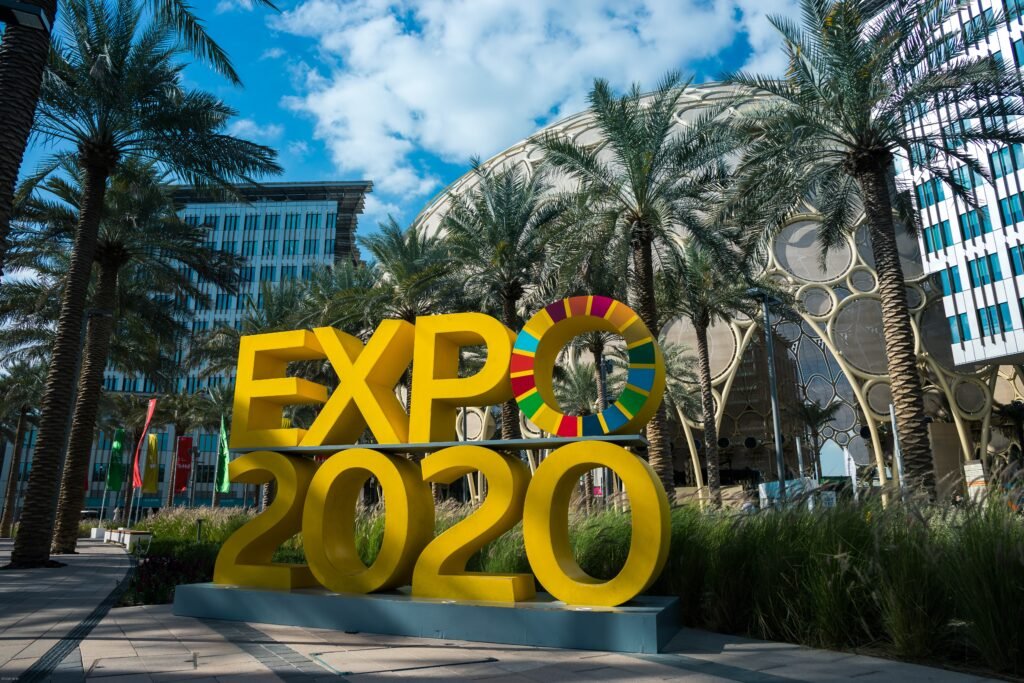
B. Dubai Green Fund
The Dubai Green Fund is an AED 100 billion fund that will provide low-cost financing for green projects in Dubai. Including renewable energy, energy efficiency, green buildings, and green transportation. The Dubai Supreme Council of Energy will manage the Dubai Green Fund and partner with banks, investors, and developers, both local and international, to support the Dubai Clean Energy Strategy 2050. Moreover, the Fund will offer incentives and guarantees for green projects, like reduced interest rates, longer repayment periods, and lower collateral requirements. The Dubai Green Fund will be a key enabler for accelerating the transition to a green economy in Dubai and for attracting and retaining green investments and businesses in the city.
C. The R&D and Innovation Programs
Dubai has established and supported various R&D and innovation programs that aim to develop and deploy cutting-edge technologies and solutions in renewable energy:
- The Dubai Future Accelerators is a 12-week program fostering collaboration between companies, entrepreneurs, and government/private sectors. It focuses on co-creating and testing solutions for future challenges like renewable energy, water, and waste management.
- The Dubai Future Foundation, which is a foundation that supports the vision and initiatives of His Highness Sheikh Mohammed bin Rashid Al Maktoum, the Vice President and Prime Minister of the UAE and Ruler of Dubai, to shape the future of Dubai and the world, through various platforms and projects. Including the Museum of the Future, which will showcase the latest innovations and trends in science, technology, and design. And the Dubai Future Research, which will conduct and publish research on the emerging topics and issues that will impact the future of Dubai and the world. Namely renewable energy, climate change, and artificial intelligence.
D. The Potential for Regional and Global Cooperation and Leadership
Dubai has also demonstrated its potential for regional and global cooperation and leadership in renewable energy and sustainability by hosting and participating in various organizations and events:
- The International Renewable Energy Agency (IRENA), which is an intergovernmental organization that promotes the adoption and sustainable use of renewable energy worldwide, is headquartered in Abu Dhabi, the capital of the UAE. Dubai has been an active member and supporter of IRENA and has hosted and attended several IRENA meetings and conferences. Including the IRENA Assembly, the IRENA Innovation Week, and the IRENA Legislators Forum.
- The Dubai Carbon Centre of Excellence, which is a leading carbon management and consulting company in the region and a subsidiary of the Dubai Supreme Council of Energy. The Dubai Carbon Centre of Excellence provides various services and solutions for reducing carbon emissions and enhancing sustainability, like the Carbon Abatement Strategy, which aims to reduce carbon emissions in Dubai by 50% by 2030. Additionally, the Dubai Green Economy Partnership, which is a public-private partnership that fosters the development of a green economy in Dubai, and the Dubai Carbon Abatement Certificates, which are tradable certificates that represent the reduction of one tone of carbon dioxide equivalent.
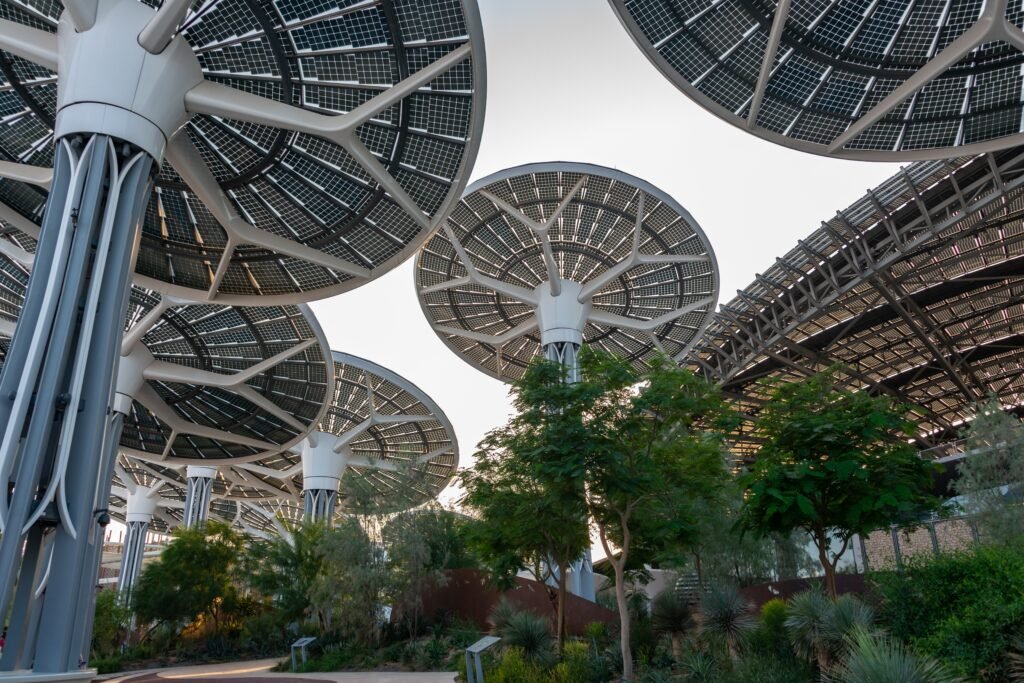
IV. Tips and Recommendations for Eco-Friendly Practices and Sustainable Solutions
Dubai is not only a sun city, a cleantech hub, and a smart city. It is also a city of eco-friendly practices and sustainable solutions. Which has made it easy and convenient for its residents and visitors to adopt and implement green habits and actions in their own homes and communities:
A. Tips for Sustainable Living in Dubai
- Use energy-efficient appliances to conserve energy and cut costs, in particular LED lights, smart thermostats, and low-flow showerheads. Additionally, remember to turn off or unplug unused devices and utilize natural light and ventilation whenever feasible.
- Install solar panels on your rooftop or balcony to generate your own clean and renewable electricity. Then connect them to the grid through the Shams Dubai program and take advantage of the net metering scheme. That allows you to sell any excess electricity back to DEWA and reduce your electricity bills.
- Reduce water consumption and reduce your water bills by using water-saving devices. like aerators, dual-flush toilets, and drip irrigation systems. Reuse greywater for gardening and landscaping and collect rainwater for washing and cleaning purposes.
- Recycle waste materials to reduce waste and landfill emissions. Including, paper, plastic, metal, and glass, and disposing them in the designated bins or collection points. Besides composting organic waste, such us food scraps and garden clippings, and use it as fertilizer for your plants.
- Support green initiatives and policies:
The government and the private sector in Dubai implement various green initiatives and policies:- The Dubai Green Building Regulations, which set the minimum standards for green buildings
- The Dubai Green Economy Partnership, which fosters the development of a green economy in Dubai
- The Dubai Carbon Abatement Certificates, which reward the reduction of carbon emissions in Dubai. You can support and participate in these initiatives and policies.
B. Join the Renewable Energy Revolution
Join the renewable energy revolution and be part of the sun city, the cleantech hub, and the smart city, here are some ways that you can do so:
- Visit the Mohammed bin Rashid Al Maktoum Solar Park: Explore the world’s largest single-site solar park, discovering phases and technologies like photovoltaic, concentrated solar power, and hybrid systems. Experience attractions and facilities like the Innovation Center, Solar Testing Facility, and Solar Innovation Museum.
- Attend Expo City Dubai: Renewable energy will exclusively power the World Expo. Attendees can explore cutting-edge technologies like the Sustainability Pavilion with its 4-megawatt solar roof. Additionally, the Mobility Pavilion features a solar-powered autonomous vehicle for convenient on-site transportation. Discover the Expo’s four main pavilions, each representing a distinct sub-theme: Opportunity, Mobility, Sustainability, and Innovation.
- Apply for the Dubai Future Accelerators: Apply for the 12-week program linking innovative companies and entrepreneurs with Dubai’s government and private sector. Co-create solutions for future challenges in renewable energy, water, and waste management. Access the resources and networks of the Dubai Future Foundation, including the Museum of the Future, Dubai Future Research, and the Dubai Future Academy.
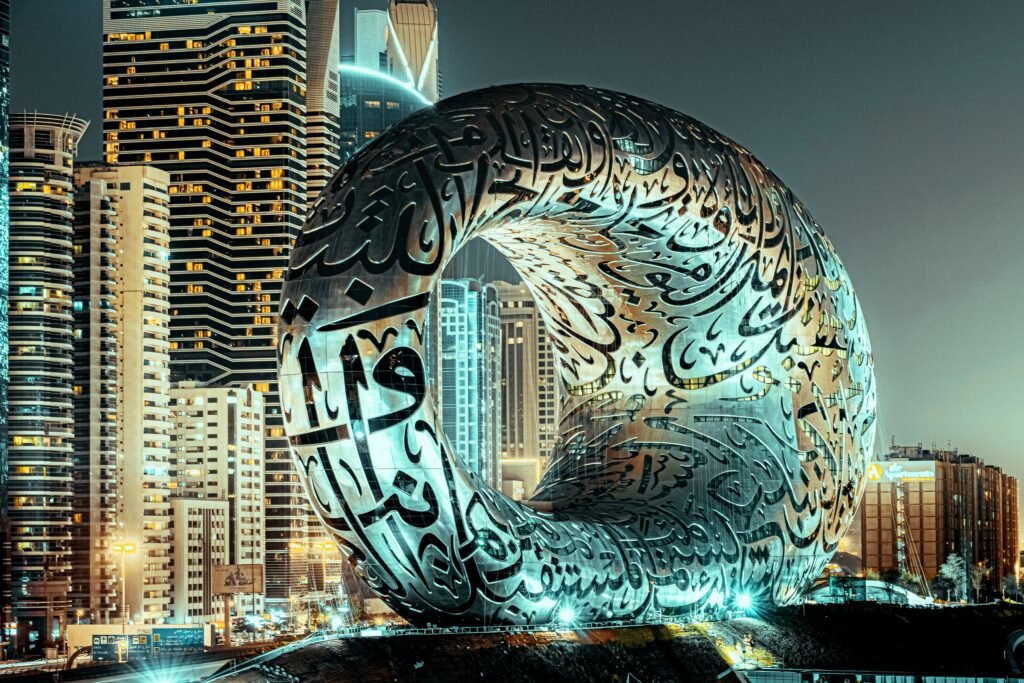
C. How to Make a Difference in Dubai’s Energy Story
Make a difference in Dubai’s energy story and contribute to its vision and goals for renewable energy and sustainability, here are some ways that you can do so:
- Share your feedback and suggestions: Provide your feedback on Dubai’s sustainability initiatives like the Clean Energy Strategy 2050 and the UAE Energy Strategy 2050, and the Dubai Integrated Energy Strategy 2030. Share thoughts on regional sustainability issues, including climate change, energy security, and green economy.
- Spread the word and raise awareness: Promote Dubai’s renewable energy and sustainability achievements and initiatives. Including the Mohammed bin Rashid Al Maktoum Solar Park, the Dubai Electricity and Water Authority, and Expo City Dubai. Educate on sustainability’s benefits, challenges, opportunities, and innovations in Dubai.
- Inspire and motivate others: You can motivate others by endorsing eco-friendly practices, like using efficient appliances, installing solar panels, reducing water consumption, recycling waste, and supporting green initiatives. Encourage them to join the renewable energy revolution in sun city, the cleantech hub, and the smart city.
D. Green Living in Dubai
To embrace an eco-friendly lifestyle in Dubai, actively adopt green practices like sustainable commuting and energy-efficient choices:
- Explore the natural and cultural heritage of Dubai: Explore Dubai’s natural and cultural heritage through its parks, gardens, and reserves, like the Dubai Miracle Garden, the Dubai Butterfly Garden, and the Ras Al Khor Wildlife Sanctuary. Immerse in history at museums, souks, and heritage sites like the Dubai Museum and Gold Souk and the Al Fahidi Historical Neighborhood.
- Engage in eco-friendly activities and hobbies: Participate in enjoyable, eco-friendly activities like cycling, hiking, kayaking, and camping. Connect with like-minded individuals through groups such as the Dubai Cycling Community, the Dubai Hiking Group, the Dubai Kayaking Club, and the Dubai Camping Group.
- Support local and organic products and services: Embrace local and organic choices. Support the environment, boost the local economy, and nurture the community. Transitioning from conventional to local and organic alternatives in various aspects of life, including food, clothing, cosmetics, and furniture, facilitates a positive impact. Explore products at markets like the Ripe Market, Organic Foods and Cafe, Greenheart Organic Farms, and Dubai Garden Centre.
V. Conclusion
Dubai is Soaring as a Sun City, a Cleantech Hub, and a Smart City
In this blog post, we have learned how Dubai is soaring as a sun city, a cleantech hub, and a smart city, and what it means for the future of energy and sustainability.
Dubai’s vision and goals for renewable energy and sustainability have been explored in this blog post. Namely: the Dubai Clean Energy Strategy 2050, the UAE Energy Strategy 2050, and the Dubai Integrated Energy Strategy 2030.
Dubai’s achievements and initiatives in renewable energy and sustainability have also been highlighted. Including the Mohammed bin Rashid Al Maktoum Solar Park, Dubai Electricity and Water Authority (DEWA), and Expo City Dubai.
The post also talked about:
- The benefits and challenges of renewable energy for Dubai and the region
- How Dubai is solving them with innovation and opportunities:
- The Dubai Green Fund
- The R&D and innovation programs
- The potential for regional and global cooperation and leadership
The Purpose of this Blog Post
This blog post aimed to:
- Inform, engage, and empower you on renewable energy and sustainability in Dubai
- Inspire you to join the renewable energy revolution and make a difference in Dubai’s energy story
We hope you learned something new and valuable from this blog post.
VI. Call to Action
Now, we invite you to take action, share your feedback, and visit the Eco-Safe Home website for more information and resources on sustainable living and household hazardous waste solutions. Here are some actions that you can take:
- Share this blog post: You can share this blog post with your friends, family, and colleagues and let them know about the amazing things that Dubai is doing in renewable energy and sustainability and how they can be part of it.
- Visit the Eco-Safe Home website: For information and resources on sustainable living and household hazardous waste solutions. Get recommendations on how to reduce your environmental impact, save money, and improve your health and well-being. Adopt eco-friendly practices and sustainable solutions in your home and community. You can also find out how to dispose of your household hazardous waste safely and responsibly.
Thank you for reading this blog post, and we hope that you will join us in making Dubai a sun city, a cleantech hub, a smart city, and a leader in renewable energy and sustainability. Together, we can make a positive impact on the environment, the economy, society, and the future of energy.
VII. FAQs
1. What is the main theme of the blog post?
A: The blog post shows how Dubai is becoming a sun city, a cleantech hub, and a smart city. It uses renewable energy and sustainability to shape the future of energy and the world.
2. What are the main sources of renewable energy in Dubai?
A: The main sources of renewable energy in Dubai are solar, wind, and hydro. Dubai exhibits substantial potential for harnessing solar energy owing to its abundant sunshine and high solar radiation levels. Additionally, the coastal location of Dubai opens up possibilities for wind and hydro energy exploitation, given the availability of water resources in the region.
3. What are the main benefits of renewable energy for Dubai and the region?
A: The main benefits of renewable energy for Dubai and the region are:
- Reducing carbon emissions and combating climate change
- Enhancing energy security and diversifying the energy mix
- Stimulating economic growth and innovation
- Improving the quality of life and health of the people
4. What are the main challenges of renewable energy for Dubai and the region?
A: The main challenges of renewable energy for Dubai and the region are:
- Overcoming technical and financial barriers
- Ensuring grid stability and integration
- Managing demand and supply
- Fostering public awareness and acceptance
5. What are the main opportunities and innovations in renewable energy in Dubai?
A: The main opportunities and innovations in renewable energy in Dubai are:
- Expo City Dubai, which will be the first World Expo to be powered entirely by renewable energy
- The Dubai Green Fund, which will provide low-cost financing for green projects
- The R&D and innovation programs, such as the Dubai Future Accelerators and the Dubai Future Foundation, which will support the development and deployment of cutting-edge technologies and solutions in renewable energy
- The potential for regional and global cooperation and leadership, such as the International Renewable Energy Agency (IRENA) and the Dubai Carbon Centre of Excellence